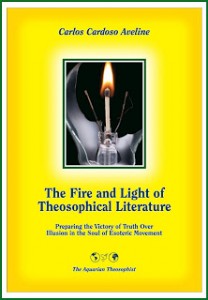
Examining the Annual Cycle of the Soul
Carlos Cardoso Aveline

When exactly does a New Year start?
In the Gregorian calendar, the new year begins on the first of January. For Jewish people, it starts in a date yearly oscillating between September and October.
According to the Eastern calendar based on the cycle of the Moon, the New Year starts in January, or February. For each human being, however, the New Year start on the day he was born.
Every celebration is beautiful – if it is sincere. However, we do not need big parties to commemorate our individual New Year. Many a theosophist feels that his birth-day is a rebirth of great inner importance and should not be the cause of any external agitation.
The skeptic may ask:
“What possible sacredness is there in one’s birthday? According to Buddhism, the personal ‘self’ is an illusion. Would it be correct for us to celebrate the birthday of a ‘self’ which does not really exist?”
In “Letters from the Masters of the Wisdom”, a Mahatma of the Himalayas admits:
“To the profane a birthday is but a twelve-month-stride toward the grave.” [1] And this may sound as sad to some, but it is true. However, there are other aspects to the matter. Lucius Seneca says in “The Shortness of Life” that the time which is given to us to live is not short, but it may seem so if we do not live in a correct way.
In fact, there is something significant and divine to celebrate in birthdays. Especially when one more year in life means one step ahead in self-improvement and in the search for inner truth.
Everything in the universe is transitory. Only the law of evolution through love, justice and truth is eternal. The fact that a human life is a limited event and will not repeat itself in its externalities makes it most valuable and worthy of celebration. Our birthdays must commemorate the passing presence, on earth, of our immortal soul.
In his classical study in ancient mythology, Thomas Bulfinch writes: “The Romans believed that every man had his Genius, and every woman her Juno; that is, a spirit who had given them being, and was regarded as a protector through life. On birthdays men made offerings to their Genius, women to their Juno.” [2]
The Roman Genius (“daimon”) is our own Spirit, our guardian angel, spiritual soul or inner Master. Nothing could be more correct, therefore, than the idea of rendering homage in our birthday to our immortal soul, Atma-Buddhi. Marcus Aurelius, the Roman emperor-philosopher who is quoted in the Mahatma Letters, wrote in his Meditations:
“Live with the gods. And he does live with the gods who constantly shows to them that his own soul is satisfied with that which is assigned to him, and that it does all that the daemon wishes, which Zeus hath given to every man for his guardian and guide, a portion of himself.” [3]
In another passage of his Meditations, Marcus Aurelius said:
“… That which is peculiar to the good man [ is ] to be pleased and content with what happens, and with the thread which is spun for him; and not to defile the divinity which is planted in his breast, nor disturb it by a crowd of images, but to preserve it tranquil, following it obediently as a god, neither saying anything contrary to the truth, nor doing anything contrary to justice.” [4]
Congratulations for our birthday should therefore be respectfully addressed mainly to our immortal spirit.
From the astrological viewpoint, our true self is as big as the solar system. Each planet or asteroid which circles the Sun is part of our personality, or at least exerts a living influence over it. The wider background to such a psychological process is the Milky Way. Entire constellations witness and inspire the inner growth of each human soul.
It is possible to attain an accurate understanding of our nature and mission through an analysis of the cosmic rays which the planets projected over us in the moment we were born. The portrait of these inaugurating energies is called birth chart. Across life, each year we undergo a certain “rebirth”. As the Sun passes by the same position in the sky where it was when we were born, all of one’s vital energy, subtle and dense, is renewed and, in up to a certain extent, born again.
It is mainly after one’s birth-day that one feels the arrival of a great relief and the presence of a new magnetic force that can be used by us.
Astrologically, the birthday is not limited to the exact day we were born, but includes at least the three days before it, and the three days after it. Thus, the conjunction of the sun in the sky with the sun in the birth-chart – popularly known as birthday – takes place along seven days.
This is a time to be kind to oneself and to let the vital energies get renewed. It’s an occasion to remember, to revise, and to make plans in peace. It is correct in these days to contemplate the Law and to listen to the wordless voice of one’s higher self, so as to better receive the unlimited blessings of universal life.
NOTES:
[1] “Letters from the Masters of the Wisdom”, edited by C. Jinarajadasa, TPH, India, 1973, first series, see Letter number I to Mrs. Laura C. Holloway, p. 147.
[2] Thomas Bulfinch’s “Mythology, The Age of Fable”. See the final paragraphs of chapter one. The book is available online. In Portuguese language, “O Livro de Ouro da Mitologia”, Thomas Bulfinch, Ediouro, RJ, 2002, p. 16.
[3] “The Meditations of Marcus Aurelius”, in “Great Books of the Western World”, Volume 12, “Lucretius, Epictetus, Marcus Aurelius”, Encyclopaedia Britannica, 1978, 310 pp., Book V, p. 272. In Portuguese, “Meditações”, Marco Aurélio, Ediouro, RJ, p. 61, livro V.
[4] “The Meditations of Marcus Aurelius”, in “Great Books of the Western World”, Encyclopaedia Britannica, 1978, Book III, pp. 262-263. In Portuguese, “Meditações”, Marco Aurélio, Ediouro, livro III, p. 42.
000
On the role of the esoteric movement in the ethical awakening of mankind during the 21st century, see the book “The Fire and Light of Theosophical Literature”, by Carlos Cardoso Aveline.

Published in 2013 by The Aquarian Theosophist, the volume has 255 pages and can be obtained through Amazon Books.
000